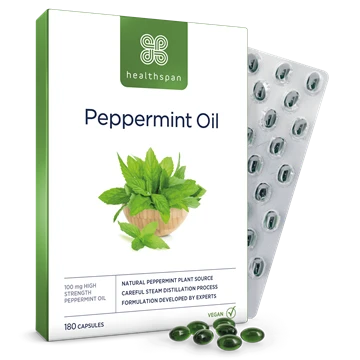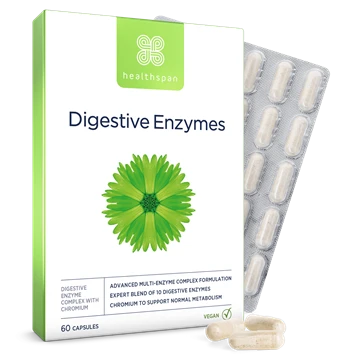Indigestion symptoms are common, can affect your quality of life and are sometimes symptomatic of something more serious. Dr Hilary Jones outlines the most common causes and what you can do to get some relief.
🕒 4 min read
Heartburn, reflux and indigestion are among the most common conditions any GP will see in their surgery. I always remember being asked by our Consultant Gastroenterologist when training as a medical student: what should we tell our patients who complain of these symptoms? He answered for us: no hurry, no worry and no curry. There is truth in all that and it's certainly memorable, but the underlying causes of digestive problems are far more complicated.
Symptoms can be fleeting, inconvenient and simply tiresome, but are sometimes long-term and capable of affecting your quality of life. Occasionally they can even be a manifestation of something more serious such as a hiatus hernia, stomach ulcer or oesophageal or gastric cancer. That's why symptoms should never be ignored or assumed to be 'just indigestion', nor self-treated with over-the-counter antacids for too long.
Common digestive problems
Unfortunately, most people will have experienced the discomfort of these conditions, but there are ways to help.
Acid reflux and heartburn
Heartburn is an uncomfortable burning sensation in the chest, which can happen for a variety of reasons. It can occur after eating or drinking, particularly after a large meal, due to obesity, or after heavy lifting and straining. Too much fatty and spicy food often triggers symptoms, as can alcohol and smoking.
Heartburn is also common in pregnancy due to the increased pressure in the abdomen. In all cases the symptoms are often made worse by stress and anxiety, as both can increase stomach acid.
Medicines such as anti-inflammatories like aspirin and ibuprofen may contribute. A weakness in the valvular sphincter at the lower end of the food pipe, or a permanent protrusion of the upper part of the stomach through the diaphragm in the same place, known as a hiatus hernia, may be an additional underlying factor.
What happens in all these situations is that strong hydrochloric acid produced in the stomach refluxes upwards into the food pipe, causing inflammation in its sensitive lining, which is not protected in the same way as the lining of the stomach.
GORD
Gastro-oesophageal reflux disease (or GORD) is a more chronic condition where symptoms can include acid that comes back into your mouth, causing an unpleasant taste as well as bad breath, belching, nausea, sore throat, persistent cough, tooth decay and even pain when swallowing.
Heartburn relief
Fortunately there are many things you can do to make matters more comfortable. These include eating little and often and avoiding food and drink that trigger symptoms. Keeping to a healthy weight is important, and regular exercise has been shown to be beneficial in reducing symptoms. Raising the head of your bed by 10-20cm to allow gravity to inhibit the flow of stomach acid upwards at night can also help with symptoms.
Supplements for heartburn and GORD
There are many over-the-counter non-prescription medicines that may be effective, but choosing wisely is important as some are more effective than others. There are three main components to heartburn and GORD: increased acid production, weakness of the valve at the lower end of the food pipe and inflammation within it once that acid has refluxed upwards.
Many proprietary remedies are only targeted at one of these issues, leaving other underlying causes untreated. Antacid liquids or tablets, for example, only deal with the acid, and lozenges for heartburn may only ease the discomfort in the gullet. The ideal remedy involves addressing any precipitating lifestyle factors as well as all three fundamental underlying problems.
GastriSoothe's triple action comes from its three key ingredients. Calming aloe vera protects and soothes the lining of the oesophagus, while sodium bicarbonate reduces and neutralises the stomach acid. Finally, sodium alginate sits like a foamy raft on top of the stomach contents and prevents acid from splashing upwards, particularly after meals and when lying flat in bed at night.
Importantly, none of these ingredients have systemic effects on the rest of the body. These may be a worry when taking prescription medicines such as H2 receptor antagonists or proton pump inhibitors.
When to see your doctor
It's important to remember that persistent symptoms that remain unexplained and fail to respond to self-help measures should always be further investigated and reported to your doctor, especially in older age groups.
This is especially true if there is any accompanying weight loss, loss of appetite or undue fatigue. It would often be appropriate in those situations for the GP to organise referral for further medical tests, including a gastroscopy, where the gullet and stomach is directly visualised under light sedation by the surgeon using a narrow flexible tube with a tiny camera.
GastriSoothe™ – plus other products that may help

GastriSoothe™
Triple-action liquid with aloe vera to soothe the stomach lining and help relieve heartburn.
View product
Peppermint Oil 200mg
High strength peppermint oil to support healthy digestion and help ease cramps and bloating.
View product
Digestive Enzymes
Digestive enzyme complex with chromium to support digestion and normal metabolism.
View product
Triple Action Biotic
3-in-1 pre, pro and postbiotic support for gut health with 20 billion live friendly bacteria.
View product







